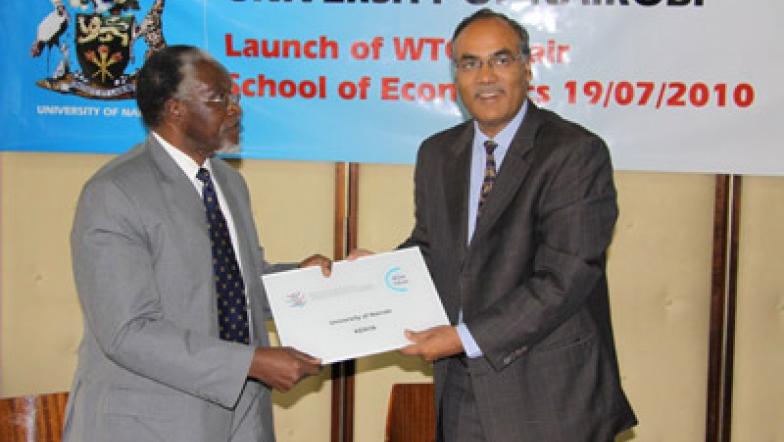DDG Singh launches WTO Chairs Programme at the University of Nairobi

In a ceremony in Nairobi, Kenya, on 19 July 2010, Deputy Director-General Harsha Vardhana Singh welcomed University of Nairobi into the WTO Chairs Programme (WCP). He said that “The aim is to help make better socio-economic policy and further strengthen informed decision-making on economic matters”.
The School of Economics at the University of Nairobi's has shown dynamism and relevance by building better opportunities and evolving with time. An example is its launch in recent years of a number of new academic programmes, including a Master of Arts in the Economics of Multilateral Trading Systems.
The establishment of the WTO Chair reflects the commitment of the academic community in Kenya, which has played a vital role in educating, training and analysing matters related to trade policy and international trade. The WCP will contribute both through augmenting domestic capacity and through interactive links with other bright minds in the other countries with these Chairs.
Deputy Director-General Singh also shared his thoughts on the importance of the WTO in helping to better achieve domestic progress. In this context, he emphasised the significant role of Kenya in the evolving global governance regime as well as the major potential which can be realized through the substantial opportunities provided by international trade and investment. He added that the University of Nairobi and its School of Economics can play a very important role in this process, and from that perspective the WCP can be one of the lynchpins for such contributions.
Since 2004, the Kenyan economy has shown relatively robust growth though the rate of growth was subdued in 2008 and 2009. This was due mainly to negative growth in the agriculture sector for these two years. The economic and financial crisis faced by the world economy in recent years has, not surprisingly, also been a difficult time for Kenya. The economic situation has improved significantly this year for both Kenya and the world economy. Kenya's real growth rate is expected to be almost 4% in 2010. This economic recovery of Kenya also reflects the increased opportunities provided by the rebound in world trade this year. After declining by over 12 % last year, world trade is expected to grow this year by about 10%. For Kenya this is important because through regional and other global markets, international trade has played an important role in the Kenyan economic performance.
The present ratio of international trade to GDP for Kenya is about 67%. This is the combined ratio of exports and imports to GDP. Individually, Kenya's exports to GDP are 26% and imports to GDP are 41%. This ratio of trade to GDP for Kenya is expected to increase over time, with the country's international trade in goods and services forecast to increase at a faster rate than its GDP. Therefore, we can see that the importance of international trade for Kenya's economy will increase over time, in the same way as it has happened for a number of other high performing developing countries.
Trade performance and policy has to be combined with appropriate domestic policies to achieve the relevant socio-economic objectives. With the recent revival in global trade, Kenya now has greater possibilities available to it through regional and global trade. Examples of Kenya's focus on benefiting from these opportunities are its initiatives such as the recently formed East African Community common market, and the active role which Kenya is playing in the Doha Round negotiations to improve the global trading regime.
The Doha Round of trade negotiations are a major effort by WTO Members to address concerns regarding the prevailing distortions in the international trading system, including trade restrictions likely to be more prevalent in the future, i.e. non tariff measures. Moreover, in the present economically difficult times, it is especially worthwhile to remember that several world leaders, across the spectrum of developed and developing countries, have emphasised that a successful Doha Round would be an important economic stimulus package with many additional positive attributes. It is worthwhile to see how the results of the Doha Round would meet the aspirations of Kenya, while taking account of its concerns.
Deputy director General Singh concluded that it is through transferring the ownership of knowledge based analysis to national universities, such as the University of Nairobi, that the population at large can access academic education, and that specialized training for trade officials in particular, can be effectively provided. We at the WTO want to promote research on WTO-related issues among young economists, and to reinforce the relationship between the WTO and the academic community both at the national and regional level. Through the universities analytical input into the formulation and implementation of trade policy, this Chair will contribute to enhance the participation of Kenya into the international trading environment.
He also took the opportunity to congratulate Vice-Chancellor, Prof. George Magoha, and in particular the WTO Chair holder, Professor Jasper Okelo, who has been instrumental in the long-standing academic cooperation relationship which exists between the WTO and the University of Nairobi.




